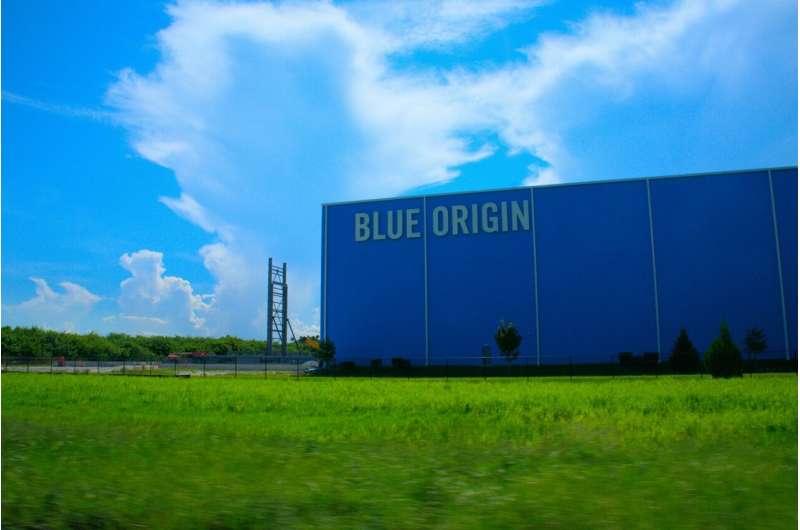This article has been reviewed according to Science X's editorial process and policies. Editors have highlighted the following attributes while ensuring the content's credibility:
fact-checked
reputable news agency
proofread
Blue Origin set to test fire New Glenn stage at Canaveral launch pad

Blue Origin has only 40 days to go to be ready for its first launch of its heavy lift New Glenn rocket, but has a lot of boxes to tick before liftoff.
That includes a test fire in the coming days of the rocket's second stage, which the company rolled out to the pad Tuesday at Cape Canaveral Space Force Station's Launch Complex 36.
Jeff Bezos' rocket company is targeting Oct. 13 for liftoff of NG-1, a mission to send a pair of satellites built by fellow rocket company RocketLab on a mission for NASA to Mars called ESCAPADE, which stands for Escape and Plasma Acceleration and Dynamics Explorers.
"We're looking forward to firing up those two BE-3Us on New Glenn's second stage in a few days," the company posted on X after the hardware's trip to the pad.
When it launches, the second stage and its engines will be tasked with deploying the twin ESCAPADE spacecraft on an 11-month trip to the Red Planet where they will study Mars' plasma and magnetic fields.
The launch, though, will be the culmination of years of development for New Glenn, which is constructed at Blue Origin's nearby factory on Merritt Island.
"Still lots to do but progress," posted Blue Origin CEO Dave Limp on X last week. "A bunch of milestones coming up in quick succession (not an exhaustive list)—engine integration, our landing barge arriving soon, hotfiring second stage… And yes, lots of unique challenges as our first flight, but folks are excited and leaning in big-time."
Bezos' company has to date only flown its smaller New Shepard rocket from a West Texas launch site. Those are only suborbital flights, but feature reentry landings that save the rocket booster for reuse. New Shepard's booster engines are similar to those in New Glenn's second stage.
Similar to SpaceX, New Glenn is designed to recover its first stage on a recovery vessel that will be stationed downrange in the Atlantic.
Blue Origin expects that ship to arrive at Port Canaveral soon, and revealed this week the vessel's name: Jacklyn, named after Bezos' mother.
New Glenn rockets are more than twice as powerful than Falcon 9 with the first stage powered by seven of Blue's BE-4 engines, the same that are used on United Launch Alliance's new Vulcan rockets. Vulcan uses only two, though, so New Glenn will produce nearly 3.9 million pounds of thrust at liftoff.
The first stage measures 188 feet tall compared to Falcon 9's first stage at 135 feet. At full height, the entirety of the New Glenn rocket will rise to 322 feet. It has a bigger fairing for payloads compared to Falcon and Vulcan rockets, coming in at nearly 23 feet (7 meters) in diameter compared to its competitors' 16.4 feet (5 meters).
NASA awarded Blue Origin a $20 million launch task order for ESCAPADE in February 2023.
It's the debut for New Glenn that expects to compete alongside SpaceX and ULA for lucrative national security missions in the future, but already has a large manifest of commercial and civil customers ready to fly if the first mission goes well.
NASA is also relying on Blue Origin and New Glenn for one of the Artemis program's two lunar human landing systems, Blue Moon.
And Blue Origin has a spate of satellite customers, including several flights for Amazon's Project Kuiper constellation.
The first-stage boosters are designed to fly up to 25 times. They would land on Jacklyn and be transported back to the port.
The company has large-enough facilities at Cape Canaveral to process three New Glenn rockets at once. Blue Origin took over the lease for LC-36 in 2015, investing about $1 billion in the pad site alone. It was previously used for government launches from 1962–2005, including lunar lander Surveyor 1 in 1967 and some of the Mariner probes.
2024 Orlando Sentinel. Distributed by Tribune Content Agency, LLC.


















